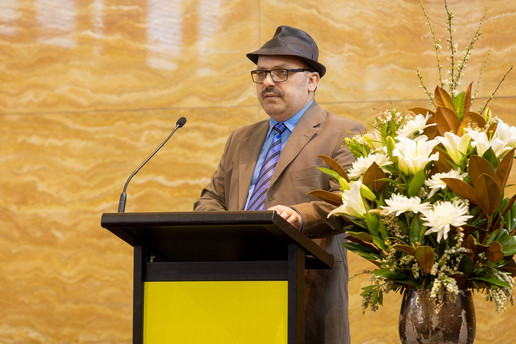UNSW launches Artificial Intelligence Institute
- Sep 13, 2022
- 3 min read
Updated: Sep 18, 2022
UNSW Newsroom | 13 September 2022

By Emi Berry
The new flagship university-wide research institute will support the activities of over 300 UNSW researchers working across AI.
Experts and industry leaders in the field of Artificial Intelligence (AI) converged on UNSW Sydney today for the launch of the UNSW AI Institute. The new institute will support the activities of over 300 UNSW academics working in AI spanning all UNSW faculties.
“Our objective at the UNSW AI Institute is to synergise the activities of researchers working in AI, machine learning, and data science, to maximise our collective impact,” said Associate Professor Haris Aziz, the interim Director of the UNSW AI Institute.
“The envisioned impact has multiple dimensions, including fostering interdisciplinary connections for both teaching and research, participation in public dialogue on AI, and driving the commercialisation of our research. The interdisciplinary aspect is fundamental to our vision which is why we are excited to have participation from all the faculties,” A/Prof. Aziz added.
UNSW Vice-Chancellor and President Professor Attila Brungs said the Institute will provide a forum for researchers and students to share ideas, and maximise opportunities for collaborative creativity and the discovery that can happen in such a fertile environment. “It will play its part in explaining to the broader community how AI can be of benefit to society, but also encourage debate about its use and limitations, including appropriate regulation.”
Experts and industry leaders attended the event, including Stela Solar, the Director of the National AI Centre at CSIRO’s Data61; Professor Peter Bartlett, Head of Research at Google Australia; Professor Toby Walsh, Chief Scientist at the UNSW AI Institute; and Dr Ian Oppermann, Chief Data Scientist at the NSW Department of Customer Service.
“United together – academia, industry, and government – we have the potential to power the future development, growth and productivity of our state. Making NSW the Australian home of responsible AI will help drive our future economy and prosperity,” said NSW Minister for Customer Service and Digital Government, Victor Dominello.
Prof Walsh said, “I've spent 40 years working in AI and it is undoubtedly the most exciting time to be working in the field. We are seeing these technologies leave the laboratory and enter our homes, offices, and factories. The role of the UNSW AI Institute is to facilitate this transfer and ensure AI is deployed responsibly, that benefits all members of society.”
A/Prof. Aziz said AI is becoming better than humans in performing many key tasks from marketing chatbots to AI safeguarding private records against cyber criminals. “Harnessing its potential and ensuring its responsible use is important. The UNSW AI Institute is a platform to help connect UNSW AI researchers with each other and the rest of the world.”
“We have a wealth of world-class researchers working on fundamental AI problems or applying AI techniques to their respective domains. The main consideration for setting up the institute was to make sure that we capitalise on our strengths and make it easier for the world to engage with us.”
The scope for AI across domains is far-reaching
AI is a ubiquitous technology that affects every domain and the potential scope across industries is far-reaching, with AI rapidly emerging in fields such as finance, social media, education, e-commerce, agriculture, entertainment, space research and security, just to name a few. Health care is a prime example of where AI is making a substantial impact.
“In the last five years, health & medicine received the largest global private AI investment ($28.9 billion). Our researchers are well-positioned to make a significant impact on the AI-med interface,” said A/Prof. Aziz.
He said medicine and biology rely increasingly on imaging technologies to process the large data sets they produce. “We have a tremendous group working on improving the reliability and throughput of biomedical diagnostics and screening.
“Another example is our members’ work on AI-empowered biomedicine to integrate and interpret clinical data to promote personalised medicine and precision therapy. The research is transformational in improving tailored treatment, facilitating drug development, and reducing the risk of various diseases.
“Our goal is to connect with the world, so do engage and keep a close eye on the fascinating work our researchers are doing,” said A/Prof Aziz.


















Comments